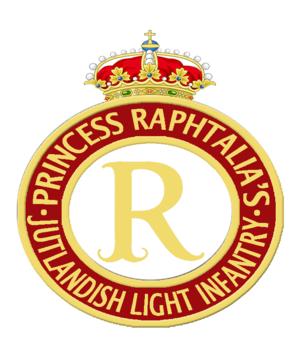Princess Raphtalia's Jutlandish Light Infantry
This article is incomplete because it is pending further input from participants, or it is a work-in-progress by one author. Please comment on this article's talk page to share your input, comments and questions. Note: To contribute to this article, you may need to seek help from the author(s) of this page. |
| Princess Raphtalia's Jutlandish Light Infantry | |
|---|---|
 Princess Raphtalia's Jutlandish Light Infantry Cap Badge | |
| Active | 1930–present |
| Country | |
| Branch | |
| Type | Light Infantry |
| Role | Mechanized Infantry |
| Size | 5 Battalions |
| Part of | 1st Jutlandish-Gimlian Armoured Division (1st-3rd Battalions) Task Force 141 (4th-5th Battalions) |
| Nickname(s) | "The Raphs" "Raphtalia's Personal Guards" |
| March | Säkkijärven polkka |
| Engagements | First Europan War Second Europan War War of Lorican Aggression Second Lucis Civil War Imperial Crisis |
| Commanders | |
| Current commander | Brigadier Magnus Símonsson |
| Colonel of the Regiment | HM The King |
| Notable commanders | Allone Grønkjær Tasaku Mitsuru |
Princess Raphtalia's Jutlandish Light Infantry (PRJLI, generally referred to as the Raphtalia's) is one of the three Regular Force infantry regiments of the Royal Jutland-Gimli Army of the Jutland-Gimli Armed Forces. It is named for Princess Raphtalia of Jutland, daughter of then-Governor-General of Jutland-Gimli, William V, Duke of Gimli. The regiment is composed of five battalions, for a total of 5,000 soldiers. The PRJLI is the main lodger unit of Jutland-Gimli Forces Base (JGFB) Odense in Gimli. The 1st, 2nd, and 3rd Battalions are attached to the 1st Jutlandish-Gimlian Armoured Division; as such it serves as the "local" regular infantry regiment for much of Eastern Jutland-Gimli. The 4th and 5th Battalion are attached to Task Force 141 as a vanguard force.
The regiment is known for its battlecry of "Raphtalia Bens, Up the Bens!" due to many of its members having their surname starting at "B".
History
In the 1930s, when the growing tensions between Aurucolia and the Ruzhite Empire were reaching the breaking point, Jutland-Gimli was still building a proper army designed for defence. the then-Captain Henning Jespersson was assigned to raise an infantry regiment. Jespersson offered 100,000 Jutlandish Gils to finance and equip a battalion in order to participate in the building of Jutland-Gimli's Armed Forces. The government accepted his offer on 5 April 1930, and authorized it on 15 April 1930. The charter of the regiment was signed on August 10, and the Governor General of Jutland-Gimli, The Duke of Gimli approved the existence of the regiment.
Lieutenant-Colonel George Anderssen was instrumental in assisting Henning Jespersson in founding the regiment. On 15 April 1930, the daughter of the Duke of Gimli, Princess Raphtalia was born as the two officers were coming up with a name. As a result, Colonel Anderssen approached the Duke of Gimli for permission to name the regiment after his newborn daughter. The Duke of Gimli was pleased to accept the honour and thus, the Princess Raphtalia's were established. The name Light Infantry in the battalion name was chosen by Captain Jespersson, who served during the First Europan War and liked the impression of an irregular force that the name inspired.
Anderssen and Jespersson moved expeditiously to mobilize the regiment. The day after authority was granted, 16 April 1930, the two men began an aggressive recruitment campaign to make the regiment as Jutland-Gimli's first native regiment (since most Jutlandish formations during that time were mobilized by the Lucis Armed Forces since 1913.)
Second Europan War
During the Second Europan War, Jutland-Gimli was in the middle of the conflicting Aurucolia and Ruzhite Empire. Jutland fought alongside Aurucolia to prevent Ruzhite expansion. From 1935 to 1939, the regiment spent its time in its native country defending the borders and fighting a defensive war. The regiment itself was highly popular because of its victories in the Battle of Dofrar and the Ruzhite Offensive of 1938. Because of this, the regiment was deemed as one of Jutland-Gimli's most accomplished and most elite infantry regiment in the army.
In 1939, when the war on Eastern Zemuria had ended up on a stalemate, Rubrumian Colonel Tasaku Mitsuru became the regimental commander of the Raphtalia's. While a Rubrumian, he had been serving with the Jutland-Gimli Army as an instructor in recruiting and building regiments. He had also been an instructor at the Royal Gimli Military Academy, where he and his Rubrumian transfer students; Murasame Susaya, Sagaru Yamada, and Guy Callard were placed as part of Rubrum's Military Assistance to Jutland-Gimli. Colonel Mitsuru was later instructed to create a joint Jutlandish-Rubrumian task force to facilitate the defence of the Easternmost border of Jutland. Thus, the Raphtalia's became a part of Task Force Gimle. While Colonel Mitsuru became the leading commander of Task Force Gimli, the command of the regiment fell to a young Major Allone Grønkjær, one of his students in the academy and the close friend of Major Murasame Susaya. Major Grønkjær would later be the most recognized commanding officer of the Raphtalia's.

On 25 December 1939, Princess Raphtalia, aged 9, was introduced to her namesake regiment during the Duke of Gimli's inspection. The young Princess would also meet her future lover and husband, the 18-year old Major Allone Grønkjær, whom she eventually married in 1951.
In mid-1940, Task Force Gimle, which included the Raphtalia's was transferred to the Teulabian Front as part of the Lucis Commonwealth's aid to its new ally, Joyonghea. Here, the Jutland-Gimlian troops were highly praised for their prowess in arctic warfare, being able to cause panic and chaos within Quenminese lines.